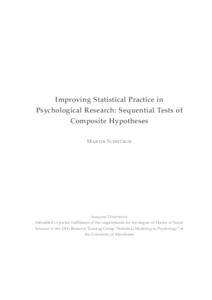|
Improving statistical practice in psychological research: Sequential tests of composite hypotheses
Schnuerch, Martin
![[img]](https://madoc.bib.uni-mannheim.de/54155/1.hassmallThumbnailVersion/schnuerch_dissertation.pdf)  Vorschau |
|
PDF
schnuerch_dissertation.pdf
- Veröffentlichte Version
Download (1MB)
|
|
URL:
|
https://madoc.bib.uni-mannheim.de/54155
|
|
URN:
|
urn:nbn:de:bsz:180-madoc-541551
|
|
Dokumenttyp:
|
Dissertation
|
|
Erscheinungsjahr:
|
2020
|
|
Ort der Veröffentlichung:
|
Mannheim
|
|
Hochschule:
|
Universität Mannheim
|
|
Gutachter:
|
Erdfelder, Edgar
|
|
Datum der mündl. Prüfung:
|
26 Februar 2020
|
|
Sprache der Veröffentlichung:
|
Englisch
|
|
Einrichtung:
|
Außerfakultäre Einrichtungen > Graduiertenkolleg "Statistical Modeling in Psychology" (SMiP)
Fakultät für Sozialwissenschaften > Kognitive Psychologie (Seniorprofessur) (Erdfelder 2019-)
|
|
Fachgebiet:
|
150 Psychologie
|
|
Freie Schlagwörter (Englisch):
|
hypothesis tests , statistical tests , sequential analysis
|
|
Abstract:
|
Statistical hypothesis testing is an integral part of the scientific process. When employed to make decisions about hypotheses, it is important that statistical tests control the probabilities of decision errors. Conventional procedures that allow for error-probability control have limitations, however: They often require extremely large sample sizes, are bound to tests of point hypotheses, and typically require explicit assumptions about unknown nuisance parameters. As a consequence, the issue of proper error-probability control has frequently been neglected in statistical practice, resulting in a widespread reliance on questionable statistical rituals.
In this thesis, I promote an alternative statistical procedure: the sequential probability ratio test (SPRT). In three articles, I implement, further develop, and examine three extensions of the SPRT to common hypothesis-testing situations in psychological research. In the first project, I show that the SPRT substantially reduces required sample sizes while reliably controlling error probabilities in the context of the common t-test situation. In a subsequent project, I seize on the SPRT to develop a simple procedure that allows for statistical decisions with controlled error probabilities in the context of Bayesian t tests. Thus, it allows for tests of distributional hypotheses and combines the advantages of frequentist and Bayesian hypothesis tests. Finally, I apply a procedure for sequential hypothesis tests without explicit assumptions about unknown nuisance parameters to a popular class of stochastic measurement models, namely, multinomial processing tree models. With that, I demonstrate how sequential analysis can improve the applicability of these models in substantive research.
The procedures promoted herein do not only extend the SPRT to common hypothesis-testing situations, they also remedy a number of limitations of conventional hypothesis tests. With my dissertation, I aim to make these procedures available to psychologists, thus bridging the gap between the fields of statistical methods and substantive research. Thereby, I hope to contribute to the improvement of statistical practice in psychology and help restore public trust in the reliability of psychological research.
|
 | Dieser Eintrag ist Teil der Universitätsbibliographie. |
 | Das Dokument wird vom Publikationsserver der Universitätsbibliothek Mannheim bereitgestellt. |
 Suche Autoren in Suche Autoren in
Sie haben einen Fehler gefunden? Teilen Sie uns Ihren Korrekturwunsch bitte hier mit: E-Mail
Actions (login required)
 |
Eintrag anzeigen |
|
|
 ORCID: 0000-0001-6531-2265
ORCID: 0000-0001-6531-2265



 Suche Autoren in
Suche Autoren in